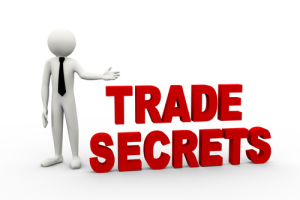Some Specific Problems With The Proposed Federal Trade Secret Law (Comments From a Reader)
Recently, David Levine guest-blogged a bibliography about a new federal trade secret law. In response to that post, a reader emailed me the following comments (which, as usual, I’m sharing with permission):
__

Photo credit: “3d rendering of business person presentation of trade secret word” // ShutterStock
On this point, I had a recent case in which the plaintiff owner of a business claimed throughout most of the lawsuit that everything the company did or owned was a trade secret, permitting ridiculously broad (and expensive) discovery; it was only at the summary judgment stage and after all sorts of discovery fights that the plaintiff grudgingly identified (loosely) what its trade secrets were. That cannot be what the designers of the statute had in mind when they drafted it.
[Eric’s comment: this seems like a problem with the pleading standards. We see a similar problem in the patent arena, and there are efforts to fix this pleading hole in patents. See Dennis Crouch’s discussion. Perhaps any new federal trade secret law could require trade secret owners to plead the existence of their trade secrets and exactly how the defendant misappropriated them with specificity? Or otherwise make it clear that the pleading is governed by Twiqbal? That seems like a reasonable expectation that could be added to the bill.]
Second, the issue of what constitutes adequate steps to maintain the confidential nature of the purported trade secret is too ephemeral. Because of the way the statute is worded, that issue almost always comes down to a dispute of fact requiring resolution by juries–often comprised of people who may not have worked in a business setting or who have been out of the workforce for some period of time. Are such people the best judges of what measures are reasonable to protect the trade secrets? It hardly seems so. As a consequence, the practical problem results that it is hard for a former employee to know whether the company did treat particular information as confidential or not. The former employee who spends a considerable amount of time or money developing a competing product or business against his former employer can be caught unawares when his former employer sends out a cease and desist letter. The former employer might just want to squelch competition. The former employee, who actually may be on solid ground, faces a dilemma: capitulate or fight on. It can be an unfair battle; the former employee may not have the confidence or financial wherewithal to defy the former employer. And of course, who is to say the former employer is being reasonable about its claim? There has to be a better way. The threat that a defendant might be able to recover his fees in response to an unsupportable claim is an illusory lifesaver.
[Eric’s comment: this is just one of the many reasons why an ex parte seizure provision is absolutely unacceptable. Ex parte, the trade secret owner will always believe they have a trade secret, and no one is around to challenge their assertions. I get into this point more in my essay.]
Third, the way the statute is written, or the way many courts have interpreted it, the requirement that the confidential information provides independent economic value is circular or self-proving and thus meaningless. Moreover, what “value” does it mean? Shouldn’t that value be significant?
Finally, the meaning of the term “willful and malicious misappropriation” is not clear or precise enough to permit awards for punitive damages or attorneys fees. In the first place, it is difficult to imagine a misappropriation that is not willful; in most cases the alleged misconduct represents an intentional tort. So why have as a condition for exemplary damages a feature that is common to the elements of the tort? As for the malicious factor, some courts have not required evidence of ill-will or spite, but have held that the factor is satisfied if the defendants knowingly disregarded the rights of others. Problem is, there is almost always some evidence the defendants knew or should have known they were using the plaintiff’s trade secrets. For some juries, that is enough to meet the statute. (The clear and convincing standard is entirely meaningless–we lawyers don’t know what that means and surely we cannot expect jurors hearing a description of it for the first time at the end of a long recitation of boring jury instructions to comprehend its meaning.) As a result, attorneys fees are too often awarded in such cases, and the attorneys fees can dwarf the actual damage amounts. That can be particularly unfair to a defendant who honestly believes the information he (intentionally) took was not trade secret.
[Eric’s comment: this is a really good point. Even though the damages provision may anticipate a higher scienter requirement than the prima facie case, given the elements required to prove “misappropriation,” will the legal standards really be interpreted differently in practice? This is another point that could be fixed in the draft bill, perhaps by defining the scienter requirement for damages to make it clear that the facts required for damages are more egregious than is required for the prima facie case.]
More fundamental, I suppose, are the economic questions about property versus competition: in the commercial/employee area, in what sort of cosmic arrangement should trade secrets fall. Perhaps out of appropriate concern that foreign companies are stealing trade secrets, we have tilted our preference towards protecting the holder of putative trade secrets. But an unintended result is that former employees are sometimes unfairly victimized by former employers, the latter of which typically have greater resources to go to war to protect dubious trade secrets. That in turn can have the effect or reducing competition. Economists, not lawyers, need to assess that issue, however, though the matter certainly gives me pause.
